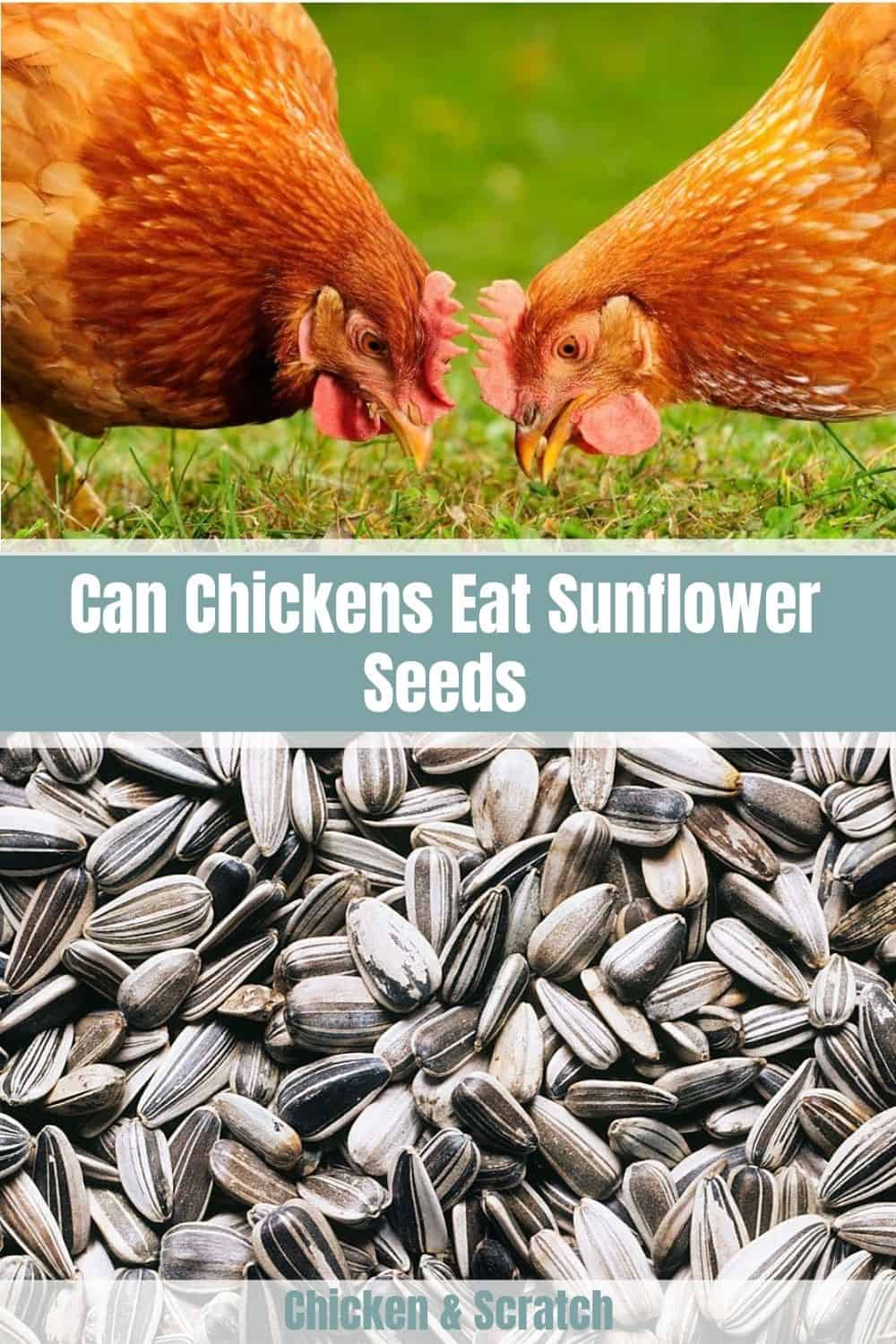Whether you intend to grow nutritious seeds for your chickens or buy from reliable stores, sunflower seeds are must-haves. Besides, sunflower seeds contain nutrients that help ease some biological changes chickens go through at different times of the year, such as molting, etc. That being said, let’s delve into the suitability of sunflower seeds for chickens.
Can Chickens Eat Sunflower Seeds?
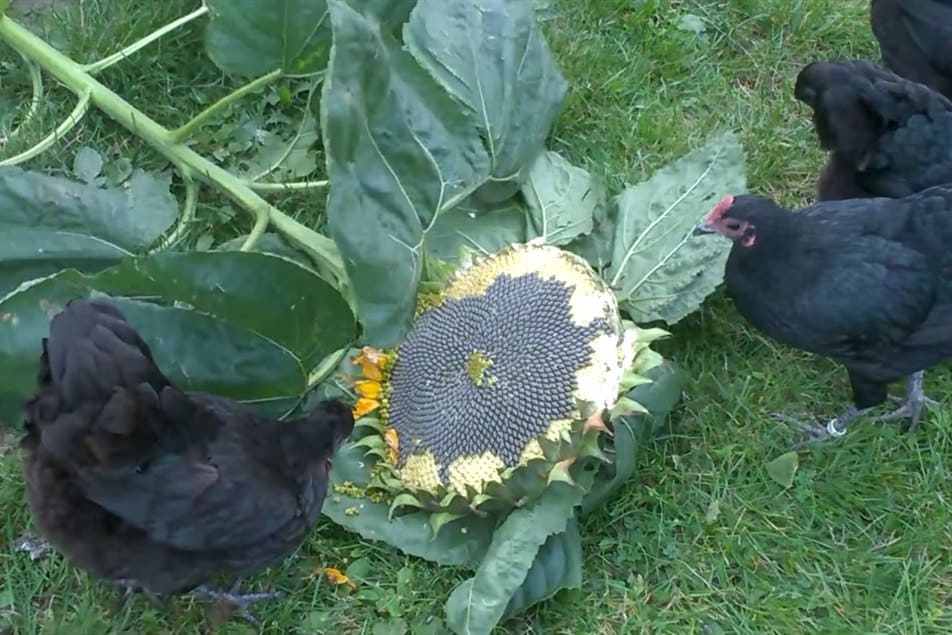
The best way to know if your chickens will eat some seeds is to give them a portion first, as long as you’ve established that the seeds aren’t diseased. Generally, chickens enjoy sunflower seeds, as many chicken keepers have observed their flocks eagerly consuming them. It is highly likely that your flock will also appreciate this treat.
Major Types Of Sunflower Seeds
However, sunflower seeds have different types, and you’ve to know which is best for your chickens. Even though sunflowers come in numerous varieties, there are 2 major types: oilseeds and confection seeds. Oilseed sunflower seeds are majorly used for making oil and other products. They’re in three categories: oleic, mid-oleic, and high-oleic.
The second major type is confection or non-oilseed sunflower seeds. Humans and animals primarily consume these seeds. To distinguish between both types, you have to look at their seeds. The oilseeds are completely black and smaller, while the confection seeds are black with white stripes and bigger.
Both types of seeds are nutritious, but oilseeds have a higher fat content than confection seeds. Their husks are intact, but confection sunflower seeds have their husks stripped, leading to lower fat content. Confection sunflower seeds are also called striped sunflower seeds.
| Oilseed sunflower seed | Confection sunflower seed |
| High-fat content. | Low-fat content. |
| Used for making sunflower oil. | Consumed by both humans and animals. |
| The husk is intact. | The husks have been stripped. |
| Completely black seeds. | The seeds are black with white stripes. |
Which is most suitable for chickens?
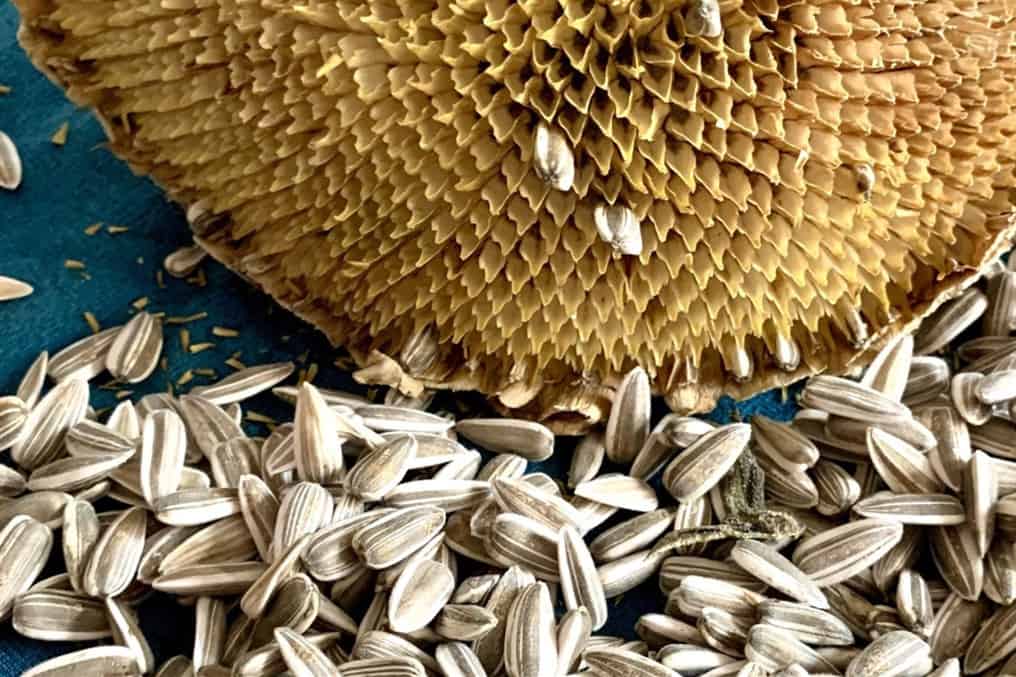
Striped sunflower seeds are best suited for consumption because of their low-fat content. Besides, stripped seeds are tastier and have a longer shelf life than oilseeds (Oilseeds can become rancid when stored for some time).
However, your chickens won’t object if you give them oilseed sunflower seeds. Most birds would remove the husk from the oilseeds before eating them, but chickens would eat everything – both husks and seeds. As such, you’ve to be careful with the number of sunflower seeds you give your chickens, as both types contain fat.
Asides the seeds, chickens can eat other parts of sunflowers such as the leaves, petals, and stems. However, these parts aren’t as tasty as the seeds. If your chickens don’t like them, stick with giving them the seeds.
How Beneficial Are Sunflower Seeds To Your Chickens?
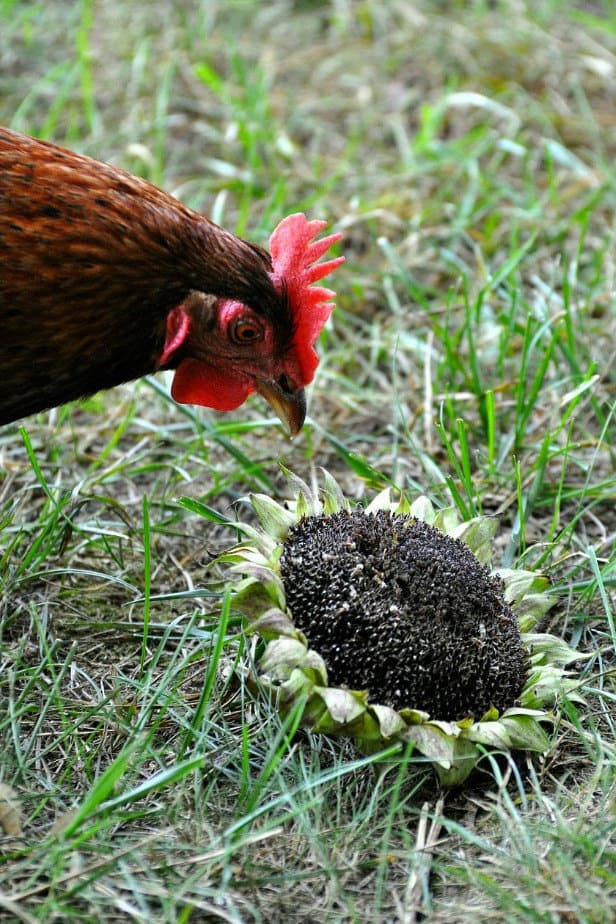
Sunflower seeds contain nutrients like vitamins, minerals, fat, etc. Besides giving a portion to your chickens, you might consider eating some yourself to enjoy the nutritional benefits. Below is the nutritional information provided by the United States Department of Agriculture for every 100 g of sunflower seeds :
| Protein | 11.7 g |
| Total lipid | 25 g |
| Energy | 238 kcal |
| Dietary fiber | 5 g |
| Calcium | 67 mg |
| Sodium | 92 mg |
| Fatty acids | 2.5 g |
| Iron | 3 mg |
| Sugar | 1.67 g |
| Carbohydrate | 10 g |
Sunflower seeds also contain other nutrients like selenium, copper, zinc, phosphorus, etc. Here are some nutritional benefits for your chickens :
Improves heart health
Sunflower seeds are rich in unsaturated fats, which have been found to lower risks such as heart diseases, high blood pressure, high cholesterol, etc. Chickens sometimes suffer from sudden death syndrome, and part of what causes it include high cholesterol in the blood. The nutrients in sunflower seeds can help reduce the chances of your chickens dying without cause.
Enhances immune system
Chickens naturally have a sensitive immune system, as they are fragile. This is why you might lose some members of your flock due to various health issues or natural causes. Therefore, you have to include foods that naturally boost their immune system in their diet.
Sunflower seeds contain vitamins such as Vitamin E, minerals, and antioxidants such as flavonoids that help fight disease and inflammation. They also have other nutrients like zinc, selenium, etc., which also help strengthen blood cells and empower the body to fight against free radicals.
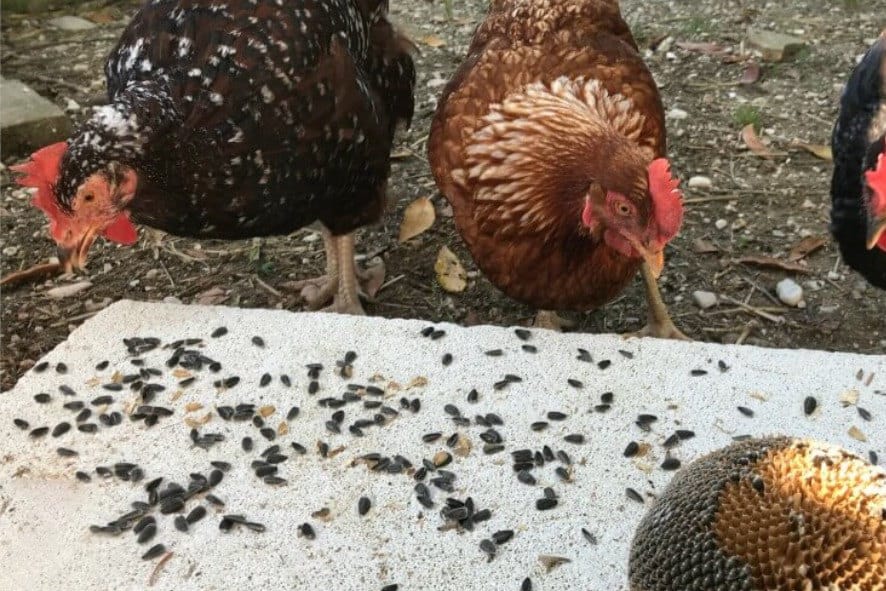
Increase energy
Chickens need the energy to do what they need to do – mating, running around your backyard, being on the alert and running from predators, eating, relating with one another, egg-laying, etc.
Either your flock is naturally quiet or energetic, it needs the energy to survive. Sunflower seeds not only help boost your chickens’ energy levels but also help them survive periods when they need extra energy, such as the molting season, cold season, etc.
Maintain healthy weight
While chickens should have meaty carcasses, they shouldn’t be obese. Obesity causes complications and might eventually lead to death. The fiber in sunflower seeds aids digestion, food absorption, prevents constipation, and stores excess fat in the body, thereby making your chickens have a perfect weight.
However, since sunflower seeds have somewhat high fat content, be moderate with the servings so that your chickens don’t end up being what you’re protecting them from.
6 Feeding Tips To Follow When Giving Chickens Sunflower Seeds
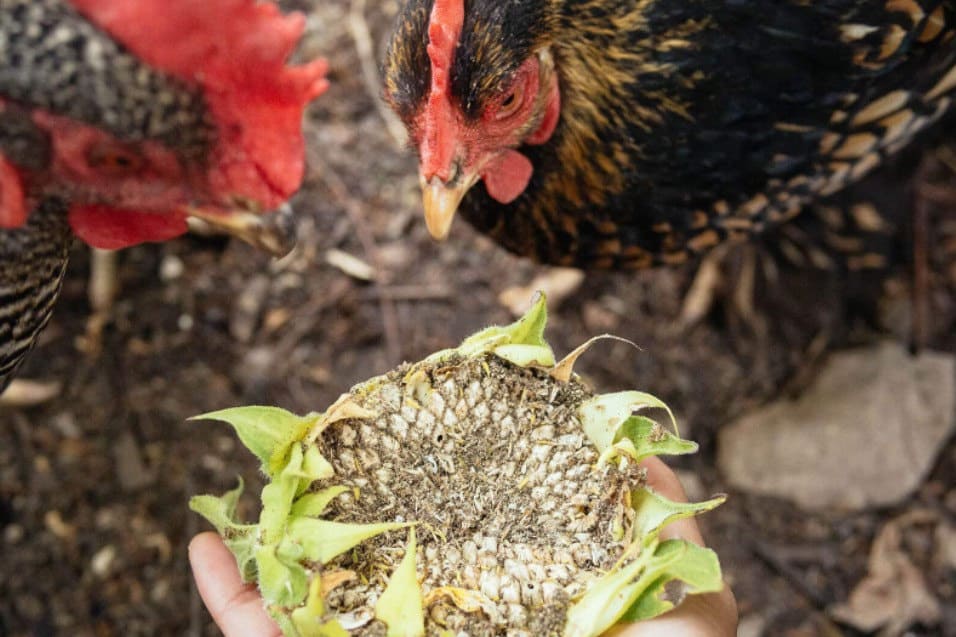
If you’re confused about whether to offer the whole sunflower to your chickens or only give them the seeds, you don’t have to be anymore. Below are some feeding tips when serving your chickens sunflower seeds:
Inspect the seeds thoroughly
Healthy sunflower seeds aren’t moldy, nor do they smell. If you’re buying the seeds from stores, ensure you check the “Best By” date. Naturally, sunflower seeds can last for a long time that you’d think they don’t spoil.
However, oilseed sunflower seeds can become rancid after a while because of their high oil content. Also, if buying from stores, don’t buy salted seeds for your chickens. Chickens don’t need salt in their meals.
Serve the sunflower head
If you enjoy watching your chickens have fun, cut the sunflower’s head and hang it on their feeder. The sunflower head contains the seeds; they’ll peck at it till they are filled. Besides, it’s a good way of exercising for them too.
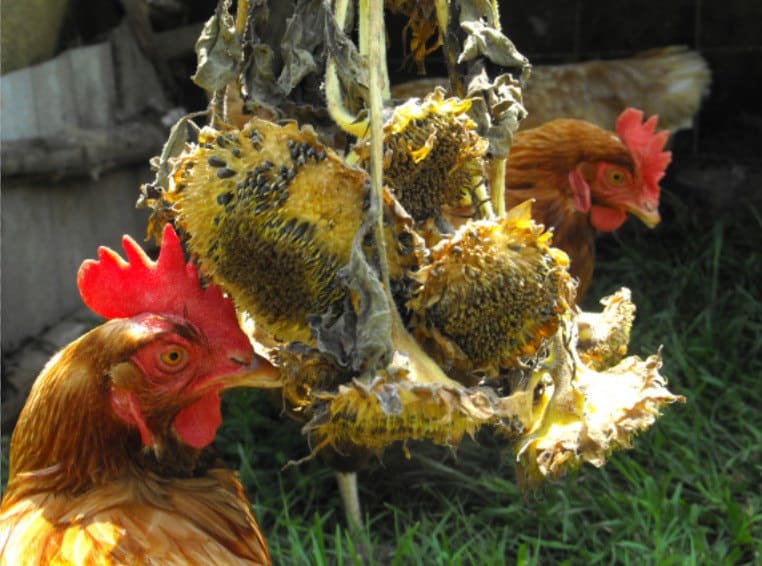
Serve the seeds only
You can also deseed a sunflower head and give the seeds to your chickens. Don’t pour the seeds on the coop’s ground. Instead, pour it on their feeder so it’ll be easier for them to peck at and for you to clean.
Serve other parts of the sunflower
As mentioned earlier, every part of sunflowers is edible for chickens. However, not all features are tasty to the same degree. The petals, stems, and flowers aren’t as palatable as the seeds, but if your chickens don’t complain, who are you not to give them?
Store the seeds properly
If the seeds remain after giving a portion to your chickens, store the remaining in a dry, cool, and dark place. Ensure the container is completely dry and airtight. Most times, storage determines how long your seeds will last. Here’s a video on how to store seeds properly:
Clean the remnants
Discard the remnants immediately after your chickens are done eating. If the seeds remain too long in their feeders, they’ll decay and start to smell.
Besides that, they’ll also contaminate every other food you put on the feeder, thereby causing diseases for your chickens. To avoid waste, don’t give many seeds at once to your flock. If your birds aren’t mature enough, too, you might have to hold on for a while before giving them sunflower seeds.
5 Other Seeds You Can Give Your Chickens
There are other seeds you can serve your chickens, aside from sunflower seeds. But ensure the seeds you serve your chickens aren’t diseased or dangerous to their health. It’s advisable you check the nutritional components and feeding information of the seeds you want to give your chickens first.
Watermelon seeds
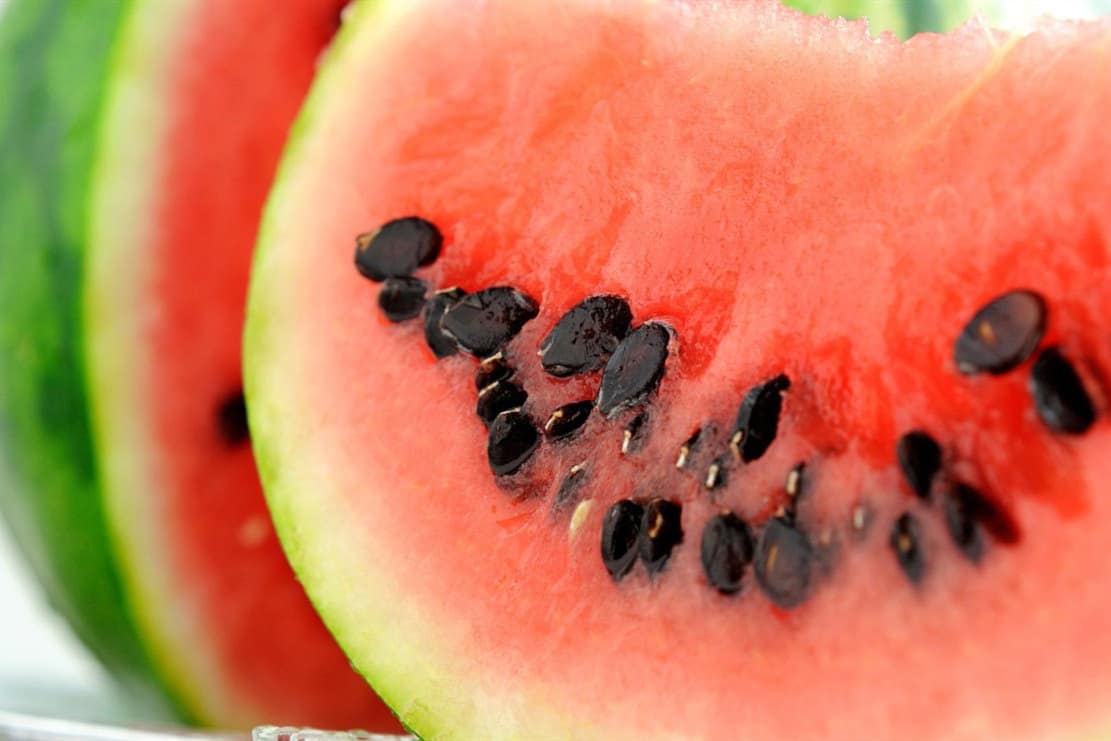
If you’ve always discarded watermelon seeds, it’s time to stop. Watermelon seeds are very beneficial – they have proportional amounts of folate, iron, magnesium, etc.
These nutrients boost your chickens’ immune system, regulate their heart health, make their plumages glossier and fresh, lower high sugar levels, and aid metabolism. If you can’t get fresh watermelon as often as you want, you can gather enough seeds, roast them and store them in airtight containers.
Sesame seeds
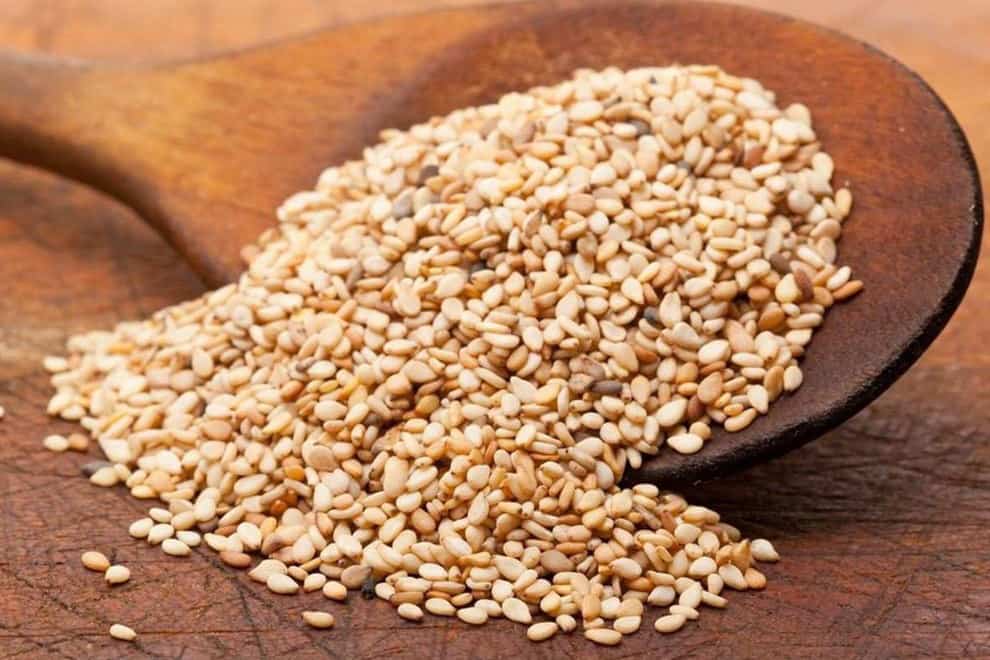
Sesame seeds are a natural favorite of many birds; except if they’re allergic to them, there’s no reason why your chickens should turn them down. They’re tiny enough to be chewed and swallowed and contain fat, thiamine, zinc, niacin, manganese, vitamins, magnesium, etc.
There are 2 types of sesame seeds: hulled and unhulled. The unhulled seeds are more nutritious than the hulled ones. You can serve sesame seeds alone or mix them with other seeds to make a seed salad.
Wheat
Research shows that birds’ diet should be at least 50% grains, and wheat is the most popular of grains fed to birds. With moderate amounts of fat and proteins, wheat is good for increasing egg production and fat in your flock. Chickens find it tasty as well.
Barley seeds
Barley seeds are nutritious and excellent for chickens who are natural foragers. They contain nutrients such as fiber, vitamins, minerals, etc., and are also readily available. Most chicken feeds have barley as one of their ingredients too. As long as your chickens love it, moderately include it in their diet.
Pumpkin seeds
Small-sized but highly nutritious, pumpkin seeds are suitable for your chickens also. They contain carbohydrates, fats, zinc, copper, magnesium, fiber, proteins, etc.
If your chickens have trouble sleeping, include pumpkin seeds in their diet. Pumpkin seeds also improve the sperm quality of your roosters, thereby increasing their mating potency. They help with maintaining internal organs and reducing cancer risks in the blood.
Summary
Now that you know that chickens love sunflower seeds, don’t deny them of this natural goodness. But keep in mind that sunflower seeds, like other treats, shouldn’t exceed 10% of your chickens’ diet. Besides, you should allow your chickens to enjoy comprehensive nutrition by giving them other seeds, as sticking to one type of seed limits their nutrition.

Joseph Hudson has been raising chickens for over 15 years. In 2018, he completed the Agriculture & Natural Resources program at Mt. San Antonio College. He currently raises over 1400 chickens on his 7.5-hectare farm. He keeps sharing his experience on raising healthy and happy chickens on Chicken Scratch The Foundry.
